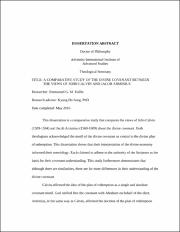| dc.contributor.author | Kollie, Emmanuel G. M. | |
| dc.date.accessioned | 2020-07-22T00:48:12Z | |
| dc.date.available | 2020-07-22T00:48:12Z | |
| dc.date.issued | 2016-05 | |
| dc.identifier.uri | https://dspace.aiias.edu/xmlui/handle/20.500.12977/70 | |
| dc.description | Unpublished Project (DMin)
Shelf Location: BT155 .K65 2017 ATDC | en_US |
| dc.description.abstract | This dissertation is a comparative study that compares the views of John Calvin (1509-1594) and Jacob Arminius (1560-1609) about the divine covenant. Both theologians acknowledged the motif of the divine covenant as central to the divine plan of redemption. This dissertation shows that their interpretation of the divine economy informed their soteriology. Each claimed to adhere to the authority of the Scripture as the basis for their covenant understanding. This study furthermore demonstrates that although there are similarities, there are far more differences in their understanding of the divine covenant. Calvin affirmed the idea of the plan of redemption as a single and absolute covenant motif. God ratified first the covenant with Abraham on behalf of the elect. Arminius, in the same way as Calvin, affirmed the doctrine of the plan of redemption 2 based upon two discontinued covenant motifs. God ratified the first with Adam and his posterity. Christ ratified the second on behalf of all who accept His atoning sacrifice. Calvin articulated a single covenant of grace; Arminius saw it as a twofold covenant of works and grace. Calvins doctrine informs humanity that (a) the divine covenant falls within the salvific context of the promise made to Abraham and his seed alone. (b) The Bible is inconsequential to the divine plan of redemption. (c) Gods monergistic plan of salvation is incongruent with the moral nature of His human creation. (d) A monergistic plan of redemption disregards any temporal reality of the divine-human relationship. (e) Human creation is immaterial to the divine being. Likewise, Arminius viewed the covenant doctrine in a pragmatic and commonsense way because through it humanity is convinced that (a) the divine covenant falls within the salvific context of a failed covenant of works in Adam and (b) a covenant of grace exists in Christ. Significantly, the way Arminius interpreted the divine covenant seems to favor the view that (c) the history of redemption began on earth between God and humanity. | en_US |
| dc.language.iso | en_US | en_US |
| dc.publisher | Adventist International Institute of Advanced Studies | en_US |
| dc.subject | Arminius, Jacobus, -- 1560-1609. | en_US |
| dc.subject | Calvin, Jean, -- 1590-1564. | en_US |
| dc.subject | Covenant theology. | en_US |
| dc.subject | Covenant theology -- Comparative studies. | en_US |
| dc.subject | Arminianism. | en_US |
| dc.subject | Calvinism. | en_US |
| dc.title | A Comparative study of the divine covenant between the views of John Calvin and Jacob Arminius | en_US |
| dc.type | Project | en_US |

